 In May, The Central Minnesota Catholic introduced a team of people who are leading local efforts for the National Eucharistic Revival, a three-year initiative of the U.S. bishops to ignite the love of the Eucharist.
In May, The Central Minnesota Catholic introduced a team of people who are leading local efforts for the National Eucharistic Revival, a three-year initiative of the U.S. bishops to ignite the love of the Eucharist.
As preparations are underway for the kickoff event, which will be held June 18 at St. Mary’s Cathedral in St. Cloud, a few of the members of the team were asked to shed light on what this initiative means for the people of the St. Cloud Diocese.
Weighing in on this topic are: Daniella Zsupan-Jerome, director of ministerial formation and field education at St. John’s School of Theology and Seminary in Collegeville; Crosier Father Kermit Holl, prior of the Crosier Priory in Onamia; and Michael Haney, who attends Holy Trinity Parish in Royalton and is a husband, father and sales manager at D.J. Bitzan Jewelers in St. Cloud. Here is what they had to say.
Q: Why are you involved in supporting and promoting this effort of the U.S. bishops?
Daniella: The eucharistic liturgy is the source and summit of our lives and yet, in the past two years during the pandemic, most of us experienced a long separation from the in-person sacramental experience. This revival comes at a time when our experience of Eucharist, and indeed, experience of life, has been tested, stretched and adapted to tough circumstances. I think this revival can truly be that: a revival, after a tough stretch of survival.
Father Kermit: I and the Crosiers support this initiative because we are a part of the local Church and have committed ourselves to being a part of the body of Christ alive in our diocese, always nourished and sustained by the grace of the Eucharist. In this way, we both receive much by sharing in the communion of the People of God, and we strive also to offer our energies and religious charism to the community of faith in Central Minnesota. Indeed, with the variety of our ministries in the diocese and the number of people the Crosiers know, we are often gathered at table in word and sacrament, not to mention in people’s homes. To share in this “communio” is the heart of our Crosier vocation within our priory and in the Church.
Michael: We are here to serve the Lord and his people. What could be a better way to serve than to bring people to the Eucharist? I have had amazing changes in my life through the Eucharist. I hope that, through sharing that, I may help others come to a closer relationship with the Lord.
Q. How do you want people to be thinking about the Eucharistic Revival?
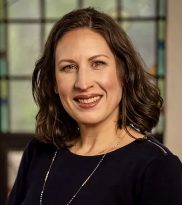 Daniella: I am hopeful that this opportunity will stir a desire in people to gather as a community. There are so many truths held together in the Eucharist through the real presence of the Lord: community, fellowship, thanksgiving, nourishment, but also self-gift, service and sacrifice. I hope these truths resonate with people today.
Daniella: I am hopeful that this opportunity will stir a desire in people to gather as a community. There are so many truths held together in the Eucharist through the real presence of the Lord: community, fellowship, thanksgiving, nourishment, but also self-gift, service and sacrifice. I hope these truths resonate with people today.
The sacraments mediate the presence of Christ in and through the elements of everyday life. Because of this, this revival is not about a top-down program brought in from some other context. Rather, I hope that through it our local communities re-encounter the presence of Christ in the midst of our daily lives here in Central Minnesota — in our parishes, in our communities, in the contexts most familiar to us. Local engagement is paramount. I think of the liturgy and the moment when the gifts of bread and wine are processed up to the altar so that they may be consecrated. I hope our local communities see themselves especially in this moment, in offering who we are to be brought to the altar.
Father Kermit: I think we should be thinking about the Eucharistic Revival with our hearts attuned to its radical nature. When we think of Jesus’ intentions of sharing a meal — breaking bread and sharing the cup — he was being radical in his hospitality as even his betrayer and those who would flee from him were there. Yet he loved them still. Greatly. And he longed to share the feast of his life with them. He was radical in his welcome and vulnerability and radical in his thought that all must be invited, all must be fed, all must be loved, as he demonstrates in his Gospel parables and encounters.
This must be the core of Eucharist as we do all this in memory of Jesus. Admittedly, it is a very difficult calling, and we can easily be distracted by less important aspects of celebrating the Mass or who is welcome in the assembly. Often that is easier than carrying the fuller call of the Gospel. I hope that the revival is Eucharist in action.
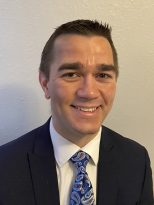 Michael: Everyone has their own path. Some are called quickly, some more slowly over time. It takes time, forgiveness and openness to be able to love and be loved. The world and the devil will do everything to stop you from loving, forgiving and accepting the things you must do to be close to the Lord. You will face all sorts of adversity. Keep coming back to the sacraments of confession and the Eucharist. Together they will heal you, strengthen you and bring you closer to the Lord. Just like a journey of a thousand miles starts with a single step, so too does your path to the Lord. The sacraments are your steps. Through them great healing will happen.
Michael: Everyone has their own path. Some are called quickly, some more slowly over time. It takes time, forgiveness and openness to be able to love and be loved. The world and the devil will do everything to stop you from loving, forgiving and accepting the things you must do to be close to the Lord. You will face all sorts of adversity. Keep coming back to the sacraments of confession and the Eucharist. Together they will heal you, strengthen you and bring you closer to the Lord. Just like a journey of a thousand miles starts with a single step, so too does your path to the Lord. The sacraments are your steps. Through them great healing will happen.
Q: There has been some division around the Eucharist in different ways. Do you think this initiative could bring about unity? How?
Daniella: I hope there may be opportunities for conversation around complex topics like these. Communication, if done faithfully and in the Spirit, is a movement toward communion. If we are able to listen to one another and have honest, respectful conversations about such disagreements, that is already a step toward unity.
Father Kermit: At its heart, the Eucharist is unity — communion. And the communion is God’s desire for us, God’s calling to us. Sadly, in our human nature, we can be quickly predisposed to judgment and exclusion and fractioning, and with the many stresses of our time, this seems more and more a temptation. Perhaps it can help for me to remember that I myself am not worthy to be at Eucharist, yet the Lord “says the word, and I am healed.” Thus, when I am feeling too righteous, I remind myself that I ought to be as generous in spirit as the Lord has been with me, and that helps me let go of the need for rigidity and perfection so that the Lord’s grace as God intends it (even unknown to us) may flow where it will. It never returns empty.
Michael: The Lord gave us the Eucharist as a gift because he knew there would always be struggles, lack of faith, pain and suffering. It is through the sacrifice of Jesus and the gift of the Eucharist that we are saved. In my life, the Eucharist has not fixed everything. But little by little it keeps me on the right path getting closer to God. It gives me the strength to break the chains of sin and to love more as Jesus did. Think of how the world would change if every Catholic loved a little more and sinned a little less. We would see an amazing transformation. What the world needs is for us to be bold Catholics. It is through the Eucharist that we will gain the strength to be bold Catholics.
Q: What is your greatest hope that will come from this revival?
Daniella: That, in the Eucharist, we become what we receive. I hope that we are able to live more eucharistically, to live out communion, fellowship, self-gift, sacrifice, in the context of
our daily lives.
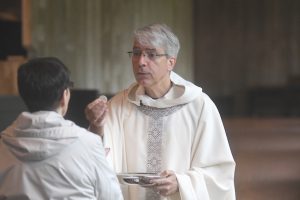
to a participant at Diocesan Ministry Day in 2019. (photo by Dianne Towalski)
Father Kermit: My greatest hope is that the Eucharistic Revival has as its core energy our meeting people where they are and walking with them in meeting the Lord anew as well as we are able.
If a person has been wounded by the Church, can this revival help them meet the healing Lord present in the Eucharist? If they are hopeless, can this revival help them connect to the gift of God meant for them? If people feel unworthy, can the revival help them trust that God “says the word” for them and welcomes them? Accordingly, my greatest hope for the Eucharistic Revival is that the love of God and the grace of the sacrament may be brought to encounter people in their joy and their sorrow, in their anger and their relief, in their life situations despite our discomfort.
The Eucharist has to be a living energy that is alive in people’s lives, which are often imperfect, troubled and neglected. That is why we gather: to be fed in our hunger and to be blessed in our “unworthiness.” God sees us only with eyes of love, and God reaches out generously with the Bread of Life that we may be nourished, whatever our need. I hope that this spirit is revived in us as Church as much as I hope that a desire for the communion of Eucharist is revived in those absent from its grace of support and challenge.
Michael: My hope is that many find renewed strength and peace from increasing the Eucharist in their lives. With that strength, we can continue to serve the Lord as each of us is called. I hope it gets Catholics to be bolder, to be Catholic and proud to be Catholic. Most of all, I hope it draws people to Jesus, Catholics and non-Catholics alike.
IF YOU GO
- When: 1 p.m., Saturday, June 18
- Where: St. Mary’s Cathedral, St. Cloud
- Keynote address by Father Derek Wiechmann, pastor of the parishes in the Four Pillars in Faith Area Catholic Community of Foreston, Milaca, Mora, Ogilvie
- Eucharistic love stories by Deacon John Wocken, Michael Haney and Mary Jo Legare-Hoffman
- Fellowship and faith sharing
- Small group activities
- Opportunities for prayer, eucharistic adoration and the sacrament of reconciliation
- Concludes with 5 p.m. Mass with Bishop Donald Kettler, including a Corpus Christi procession
For more information, visit www.stcdio.org/eucharistic-revival/.

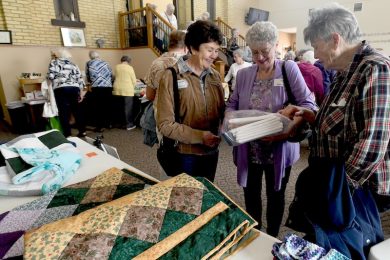


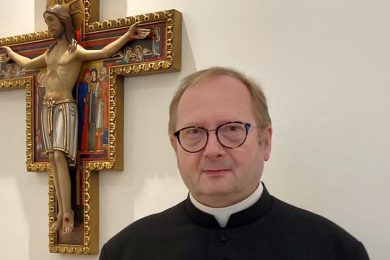
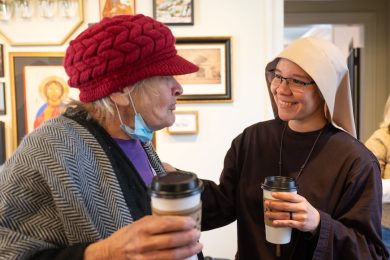


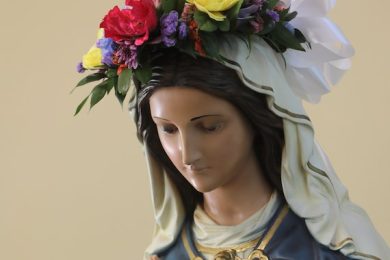











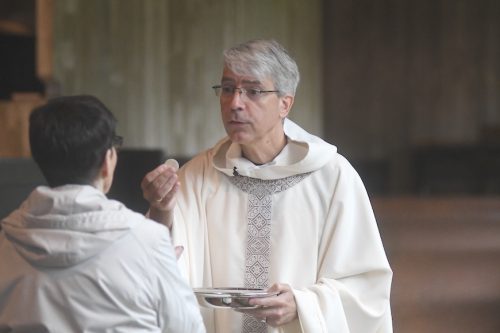
I like what Danielle says; We are stretched to tough circumstances. stir a desire in people to gather as a community. Gifts of bread and wine are carried to the altar. We become what we recieve. Kermit OSC : the communion of the Eucharist. Jesus intentions of sharing a meal. Eucharist has to be living energy. Michael; Come to a closer relationship to the Lord. Some are called quickly, some slowly. Get Catholic to be bolder…..
Tony Kroll says, Jesus gave and gives us a great sacramental incarnated legacy . It’s Ok if it looks like a meal.